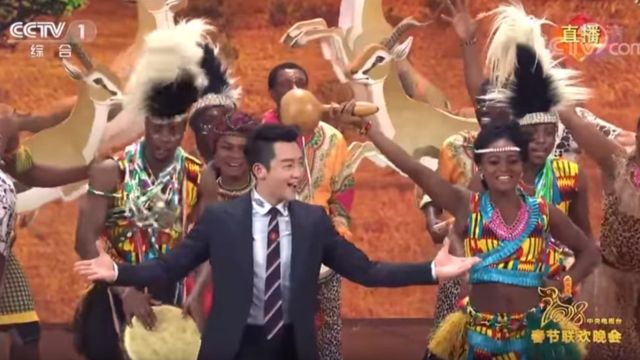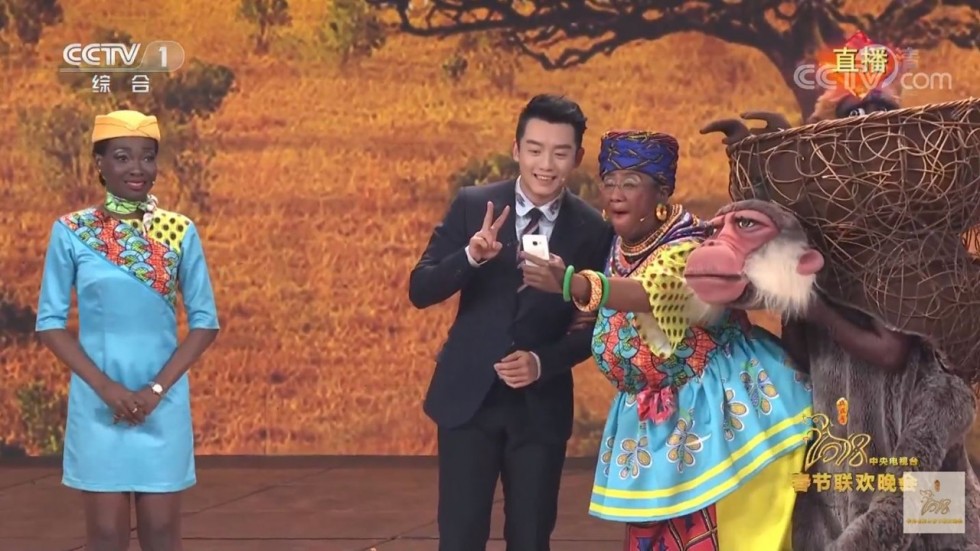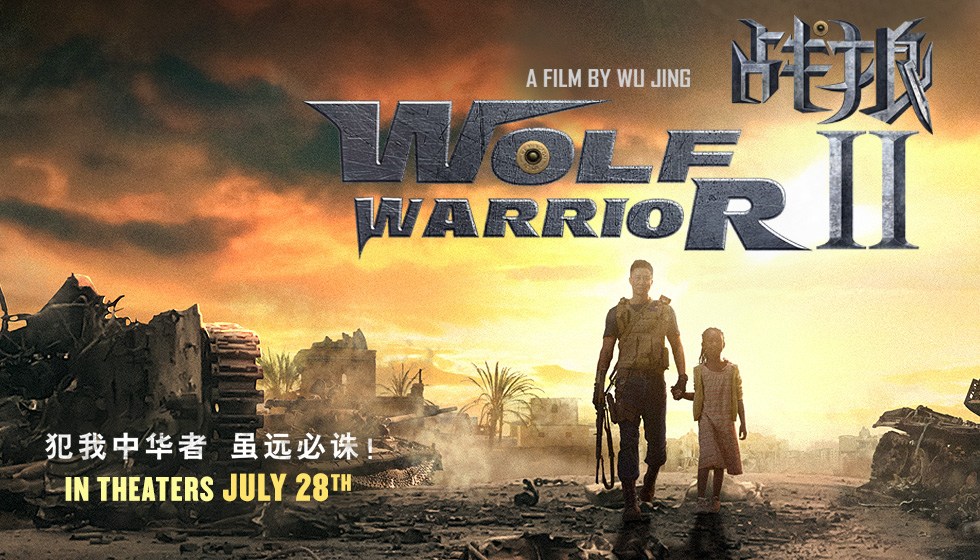by Brian Hioe
語言:
English
Photo Credit: CCTV
A SKIT FEATURING the extensive use of blackface on state-run television network CCTV has provoked outrage from many. The skit was broadcast as part of the annual Spring Festival gala television program which it is the common custom of many Chinese families to gather and watch over the Lunar New Year. The program is thought to have up to 900 million viewers and is certified as the world’s most widely watched television show.
The skit in question, which featured some African performers but whose main characters were primarily Chinese actors in blackface, was ostensibly aimed at promoting Sino-African ties. African characters and Chinese characters alike extolled Sino-African ties, as forged by Chinese infrastructure building projects in Africa such as the recently launched Mombasa-Nairobi Standard Gauge Railway, as well as past precedents of “South-South cooperation” during the Mao era.
 Photo credit: CCTV
Photo credit: CCTV
Such projects have come under fire in recent years with accusations that China is acting as a neo-colonial power in Africa. This would be through binding African countries to China through large loans, as well as using infrastructure building projects as a way to secure an economic foothold in Africa that will allow for exploitation of developing African nations. While China claims to only be acting altruistic, China has also come under fire for actions including accusations that China bugged the African Union headquarters in Ethiopia which it subsidized the construction of. With Chinese construction of its first overseas military base in Djibouti, some see this as the beginning of Chinese imperial ambitions to have a network of military bases spanning the globe much as the United States currently has.
Although controversy regarding the gala video has been large, this would be far from the only time in recent years in which racism in Chinese media has led to international outrage in the past few years. In 2016, an ad for Chinese laundry detergent Qiaobi showed a black man being thrown into the laundry and re-emerging as a Chinese man, for example. An museum exhibition in October last year also provoked outrage through featuring pictures of Africans next to animals with similar expressions.
A video released by state-run media in August of last year criticizing India for border disputes with China similarly featured a Chinese actor wearing a turban and fake beard and speaking with an Indian accent in such a manner as to spark accusations of racism. Chinese action film Wolf Warrior 2, the highest grossing Chinese film in 2017, was set in Africa and had a plot that played up China’s role as a benevolent savior for Africa, not unlike the long history of Hollywood movies in which an American action hero acts as savior to some third world country.
 Still from the Qiaobi laundry ad. Photo credit: Qiaobi
Still from the Qiaobi laundry ad. Photo credit: Qiaobi
The contents of the skit, however, will likely add to accusations of neo-colonialism regarding China’s role in Africa. Namely, the plot of the skit features a Chinese man in Africa on the eve of his marriage, a teacher, whose 18-year-old female black student asks him to pretend to be engaged to her in front of her mother so that she can delay marriage a few more years in order to go study in China. The Chinese man is reluctant to do so, which is the source of dramatic tension in the skit, and comic drama ensues from the deception in front of his student’s mother, played by an actor wearing a large false rear end. But all is resolved in the end when the female student’s mother proves understanding, herself recalling Chinese cooperation with African countries in her youth, and seeing Chinese entering Africa as continuing this legacy. The black characters in the play then all express their love for China, and the Chinese man is able to happily marry his Chinese fiancé.
Apart from the obviously questionable nature of Chinese actors in blackface expressing love for China, suggesting the means by which China wishes to ventriloquize African support for China, what is notable about the skit is that Chinese characters are depicted in contrast to African characters as clean cut and wearing western suits. Most African characters are depicted in tribal clothing. Those African characters shown in western clothing are mostly dressed as receptionists, shown to be submissive to the orders of Chinese characters, and it is suggested that their “civilization” was because of Chinese education.
In the skit, an anthropomorphic monkey and a giraffe also seem to stand in for Africans, suggesting that Africans may not be so different from animals for Chinese. African is depicted as wild and full of animals and Africans are more generally depicted as a singing and dancing people, perhaps not so different from how “ethnic minorities” in China are depicted.
 Still from the skit. Photo credit: CCTV
Still from the skit. Photo credit: CCTV
Furthermore, dialogue in the skit make jokes of black skin color in a strikingly racist manner. For example, when the Chinese man’s brother-in-law arrives and is confused to find that he has a black “wife”, the Chinese man attempts to claim that his black student is his Chinese wife wearing heavy makeup, evoking shades of the Qiaobi laundry ad. In banter with his student’s mother, the Chinese man jokes about whether children he would possibly have with his student would be “black” or “white”.
As with other incidents of Chinese racism in media, one is struck by the degree to which such racism consists of internalizing past western racist tropes. Blackface is, of course, adopted from past western practices. In the depiction of Africans as a simple, singing and dancing people that are civilized by Chinese education, one finds echoes of how the western world once depicted what it saw as the positive effects colonization—except with a Chinese man standing in for the role once played by a white man. Indeed, this aspect of the play reminds of Wolf Warrior 2 largely mimicking white action hero savior narratives, except with a Chinese protagonist. This more generally points to how China in the present seeks to supersede the western world, in stepping into the position of global hegemony that America formerly occupied but is seen as vacating.
With regards to dialogue touching in interracial marriages, one notes how in Chinese nationalist films in recent years, there is also the undertone of opposition to “miscegenation” in the skit—apart from this also being seen in the Qiaobi laundry ad, in which a black man needs to be washed into a Chinese man, one observes how The Great Wall took a stance of opposition to interracial relationships, as well. If the dramatic conflict of the play results from the possibility of an interracial marriage and the upending of the status quo, the resolution comes from the status quo of the normative Chinese racial relationship being restored by the end of the skit. Notably, racial intermarriage is too much for the skit, even if this is a marriage that replicates colonial dynamics of domination between a Chinese man and an African woman.
 Poster for Wolf Warrior 2. Photo credit: Wolf Warrior 2
Poster for Wolf Warrior 2. Photo credit: Wolf Warrior 2
In conclusion, what is most striking about the skit is that it was approved by government censors at the highest-level to be shown to 900 million individuals, apparently without realizing that the skit would lead to international backlash. Perhaps, then, the skit indirectly gives the lie to Chinese claims that China only seeks to act in Africa’s best interest, without any racism or imperial ambitions.

